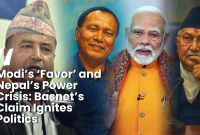Pakistani Army Delegation Claim Sparks Questions on Timing in Nepal

Kathmandu – Nepal finds itself in an increasingly uneasy position as tensions between its nuclear-armed neighbours, India and Pakistan, escalate dramatically following the tragic Pahalgam terror attack. Adding a fresh layer of concern, Nepali Member of Parliament, Amresh Kumar Singh, made a startling claim in the House of Representatives on Tuesday: that an 11-member Pakistani Army delegation is currently in Kathmandu.
This claim lands in a capital already simmering with unease. In recent weeks, Kathmandu has witnessed several protests outside the Pakistani Embassy, fueled by public anger over alleged links to terrorism, particularly after a Nepali citizen was among the 26 killed in the Pahalgam attack. Some of these demonstrations even included demands for the closure of the embassy, reflecting a heightened sense of public anxiety regarding foreign interference and terrorism.
Addressing Parliament, independent MP Singh questioned the timing and intent behind such a high-profile military visit. "There is tension between India and Pakistan after the attack in Kashmir's Pahalgam. War can break out at any time. In such a situation, the Nepal government has invited an 11-member delegation of the Pakistani army...What message does the Government of Nepal trying to send out?" he queried, his words echoing the concerns of many ordinary Nepalis caught in the geopolitical crosscurrents.
MP Singh further provided specific details, alleging, "That Pakistani Army delegation came on Qatar Airways flight number 646... under the leadership of Mansur Ansari." He poignantly added, "Can we take anyone's side? The timing is not right. I don't mean that Pakistanis should not come but it is the time when a Nepali citizen also was killed in that terror attack." The Nepal Army is yet to issue any official comment on these claims.
This development, whether the delegation's purpose is routine or otherwise, touches a particularly raw nerve in Nepal. It comes hot on the heels of our previously reported story on India's National Investigation Agency (NIA) interrogating extradited 26/11 Mumbai terror attacks plotter, Tahawwur Hussain Rana. A significant focus of Rana's questioning, as we highlighted, revolves around chilling revelations made years ago by his accomplice David Coleman Headley, alleging a secret Pakistani ISI and Lashkar-e-Taiba (LeT) terror 'setup' operating from Nepali soil. While MP Singh's claim about the current army delegation is a separate matter, such events collectively fuel public apprehension about Nepal's neutral stance and the potential misuse of its territory. The Rana-Headley disclosures painted a grim picture of past exploitation, and any high-level engagement with Pakistan at this sensitive juncture is bound to be scrutinized heavily by a concerned public.
The backdrop to these events is one of intense regional strain. Following the Pahalgam attack, India has put its Indus Water Treaty with Pakistan in abeyance, leading to reports from Pakistan's Dawn News of significantly decreased water flow in the Chenab River, a vital source for Pakistan's irrigation. Internationally, Pakistan faced tough questions at a recent informal UN Security Council closed-door session, where members reportedly refused to accept its "false flag" narrative for the Pahalgam attack and queried the likely involvement of the UN-proscribed LeT, a group with deep ties to Pakistan.
For the people of Nepal, these are deeply unsettling times. The loss of a Nepali life in a terror attack in Kashmir, coupled with claims of foreign military presence and past allegations of terror networks on home soil, raises profound questions about national security and foreign policy. As Nepal navigates this delicate period, transparency from the government regarding MP Singh’s claims and reassurance of the nation's unwavering neutrality and security will be crucial in calming public anxiety. The shadow of regional conflict looms large, and Nepalis are watching, hoping their land remains a zone of peace, untouched by the turmoil engulfing its neighbours.




![From Kathmandu to the World: How Excel Students Are Winning Big [Admission Open]](https://www.nepalaaja.com/img/70194/medium/excel-college-info-eng-nep-2342.jpg)
